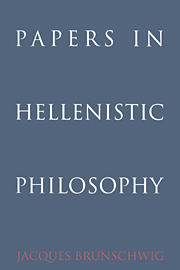Book contents
- Frontmatter
- Contents
- Acknowledgements
- Preface
- I EPICUREANISM
- II STOICISM
- III SCEPTICISM
- 9 Once again on Eusebius on Aristocles on Timon on Pyrrho
- 10 The title of Timon's Indalmoi: from Odysseus to Pyrrho
- 11 Sextus Empiricus on the κριτήριον: the Sceptic as conceptual legatee
- 12 The ὄσον ἐπὶ τῷ λόγῳ formula in Sextus Empiricus
- Bibliography
- Index of subjects
- Index of names
- Index of passages cited
11 - Sextus Empiricus on the κριτήριον: the Sceptic as conceptual legatee
Published online by Cambridge University Press: 25 October 2009
- Frontmatter
- Contents
- Acknowledgements
- Preface
- I EPICUREANISM
- II STOICISM
- III SCEPTICISM
- 9 Once again on Eusebius on Aristocles on Timon on Pyrrho
- 10 The title of Timon's Indalmoi: from Odysseus to Pyrrho
- 11 Sextus Empiricus on the κριτήριον: the Sceptic as conceptual legatee
- 12 The ὄσον ἐπὶ τῷ λόγῳ formula in Sextus Empiricus
- Bibliography
- Index of subjects
- Index of names
- Index of passages cited
Summary
Scepticism, as is well known, is a therapy for philosophical illnesses. But it does not spend much time in classifying those illnesses: the disease to fight against, in spite of its manifold forms, is always dogmatism. To the Sceptic, all non-Sceptical schools are dogmatic, whether ‘properly speaking’ (ἰδίως, PH 1.3) or in a particular way: the Academy itself professes a kind of upside-down dogmatism (PH 1.226). Eclecticism is never mentioned by Sextus, although the thing is not unknown to ancient philosophy, nor is the word unemployed. The reason for this silence is perhaps that eclecticism is less a philosophical illness than an alternative medicine, aiming at curing the same ills as Scepticism does (namely, conflicts among the dogmatists), but in an opposite way and on the basis of a different diagnosis. To the eclectic, doctrinal conflicts are superficial conflicts; philosophical doctrines are compatible at bottom, at least piecemeal, and perhaps even globally they converge. When looking at the philosophical stage, the Sceptic sees quite a different play: to him, the disagreement between systems is irreducible. An eclectic philosopher might actually accuse the Sceptic of being himself a kind of metaphilosophical dogmatist, in the sense that he admits not only that philosophers seem to contradict each other, but also that they actually do so; one might remind him of his zētētic disposition and invite him to be more careful before asserting the objective reality of those conflicts.
- Type
- Chapter
- Information
- Papers in Hellenistic Philosophy , pp. 224 - 243Publisher: Cambridge University PressPrint publication year: 1994
- 2
- Cited by



